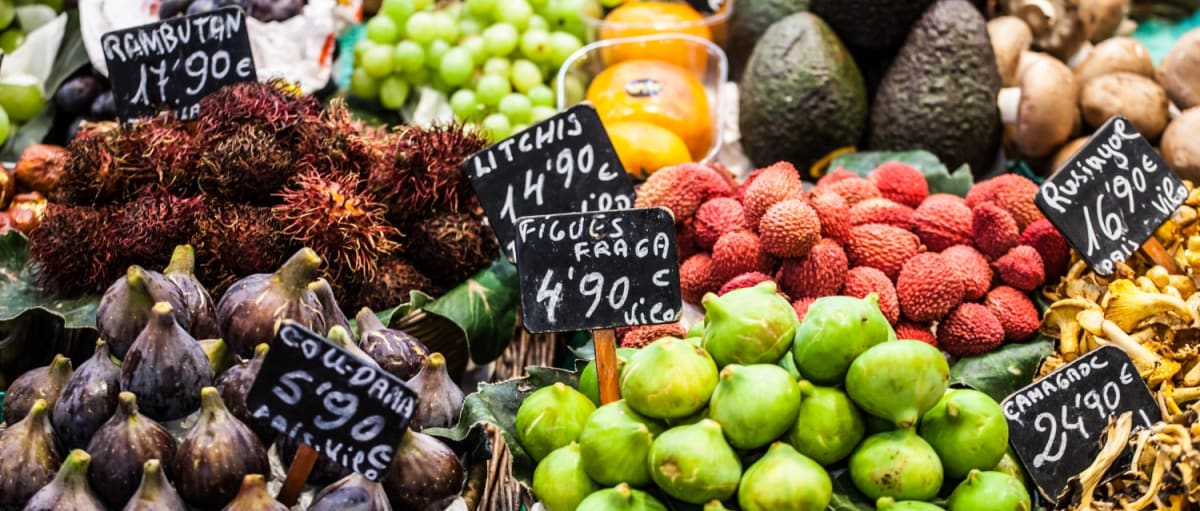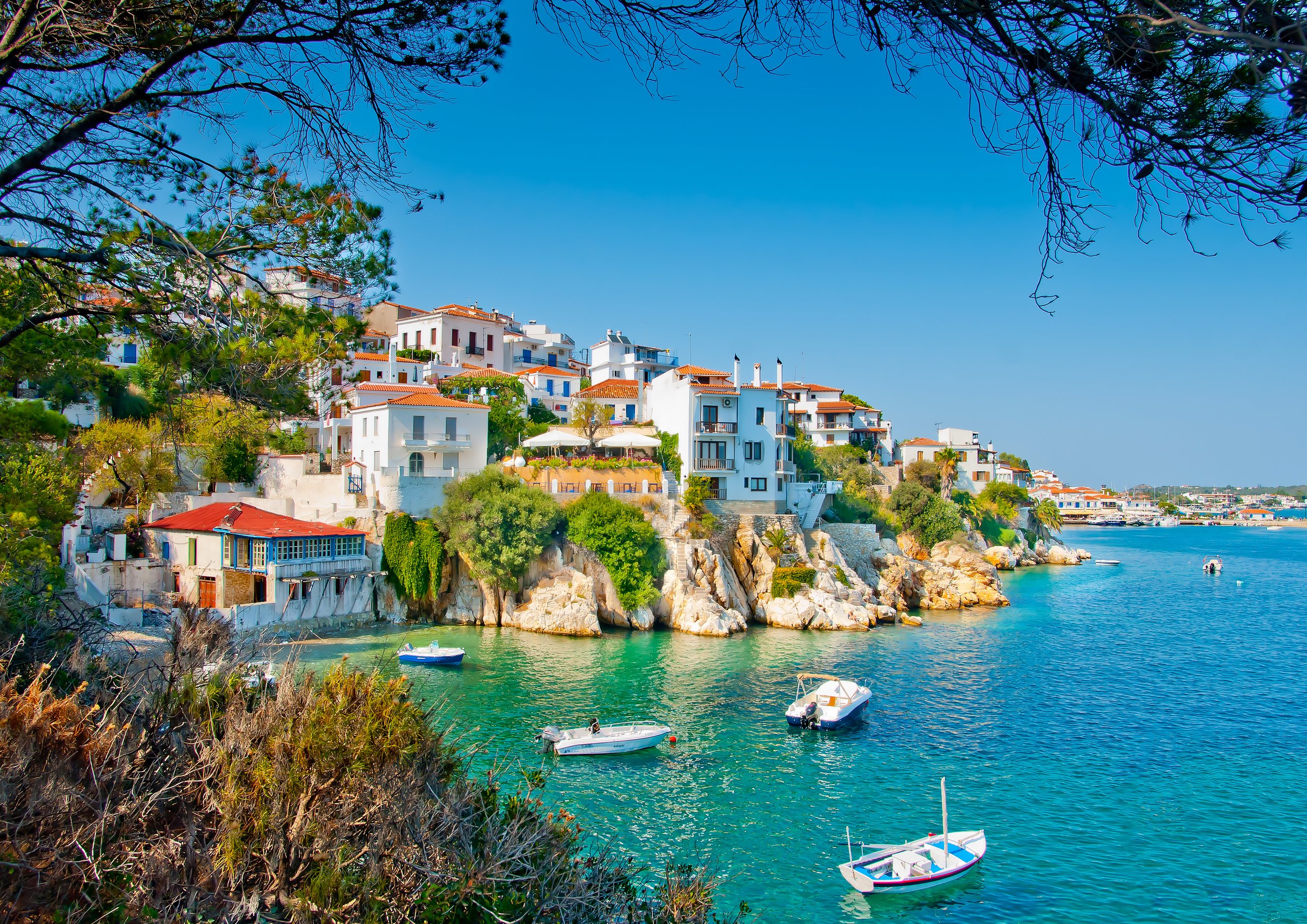Shopping in Spain is as much about the experience as it is what you take home. From lively evening shopping streets and colourful local markets to international supermarkets and stylish homeware boutiques, you’ll soon see why everyday shopping feels more special than it does back home.
Once you’ve moved into your new Spanish home and unpacked the essentials, shopping will quickly become part of everyday life. While you’ll recognise international brands and supermarkets, the real joy is discovering Spanish staples, seasonal produce and reliable local shops. With lively high streets, dependable local stores and a strong culture of personal service, shopping in Spain combines convenience with character.
Download the Spain Buying Guide
Contents
Opening times
Hours vary by region, but the typical weekday pattern is 10am–8pm with a midday pause between roughly 2pm and 5pm for the siesta. In resort areas and major cities many shops stay open through the afternoon. Saturdays are mixed: larger stores often open all day, while smaller independents close after lunch. Sundays and public holidays are usually a day off for retail, although tourist zones can be an exception.
Supermarkets
On the Costa del Sol and Costa Blanca, you can find British products with ease. There are British-owned supermarkets such as Iceland, and Marbella even has a Marks & Spencer for food and home treats. If you live within reach of Gibraltar, the large Morrisons is a handy one-stop shop for familiar brands. That said, it’s well worth shopping in Spanish supermarkets, where you’ll get better value on local favourites and fresh food.
| Supermarket | What it’s good for | Helpful notes |
|---|---|---|
| Mercadona | Everyday value, good own-brands | Own brands are Hacendado (food) and Deliplus (personal care); stores are widespread and reasonably priced |
| Carrefour | Large ranges and international items | Good for products that are harder to find elsewhere |
| Alcampo | Hypermarket shopping | One of Spain’s biggest hypermarket operators, useful for bulk buys |
| Dia | Budget groceries | Convenient neighbourhood stores with low prices |
| Esclat / Bonpreu | Catalonia-based supermarkets | Esclat feels upmarket, but prices are competitive; also offers utilities and discounted fuel via loyalty card |
Lidl and Aldi run regular country-themed promotions – Italian, Greek, German, French or Asian weeks – which are popular for stocking the cupboard with good-value imported items. Fresh produce is largely seasonal in Spanish supermarkets. Most have a fish counter with labels for origin and whether the fish is farmed or line-caught; the day’s catch typically arrives late afternoon or early evening. Butchery counters vary in quality, so try a few and see which cuts you prefer. Vegetarians and vegans now have more choice than they did a few years ago, with plant-based lines appearing even in budget chains.
Local markets
Open-air and covered markets are part of daily life and a highlight of shopping in Spain. Picture tubs of olives, strings of chorizo and immaculate piles of seasonal fruit and veg, with live seafood. It’s not just shopping – it’s a social occasion, with tapas bars and coffee counters woven between the stalls.
Typical hours are 9am–2pm. In the largest cities, central food markets open most weekdays. The most famous include La Boqueria in Barcelona, Mercado de San Miguel in Madrid, Atarazanas in Málaga and Mercat de l’Olivar in Palma. For non-food browsing, Madrid has La Cuesta de Moyano (second-hand books) and the El Rastro flea market on Sundays.
Clothes shopping
Spain’s high streets are lively in the evenings thanks to the paseo, and fashion is a big part of that. You’ll recognise international names and plenty of Spanish brands. As a rough rule, you’ll find clothes at either end of the price scale – designer pieces and very affordable basics – with solid mid-range options if you know where to look.
Spanish brands to look out for include Zara, Massimo Dutti, Mango, Bershka and Camper shoes, as well as luxury fashion house Loewe. International staples H&M and Primark are widespread in cities. Punt Roma caters well for women over 30, Benetton covers a younger market and in parts of Andalusia you’ll also find Dunnes Stores for UK and Irish labels. Don’t ignore independent boutiques in your local town: even expensive shops have discounts and sales.
Sales (rebajas) run twice a year and are a good time to invest in items that were just beyond your budget, though reductions are usually less dramatic than in the UK or US. At the other end of the spectrum, extremely low-priced T-shirts and beachwear are everywhere.
Household and homeware
If you’re finishing a room or equipping a holiday home, you won’t struggle. Local “Chinese shops” carry a bit of everything – cleaning gear, kitchenware, stationery, small DIY and garden bits – with the bigger stores resembling a compact department store. Prices vary, so it’s worth comparing.
For homeware, try Casa (a Belgian chain) for on-trend décor and useful household items. Maisons du Monde (French) leans more upmarket for furniture and accessories. La Loja do Gato Preto (Portuguese) is great for tableware and textiles with personality. Spanish chain Muy Mucho is good for natural materials – wood, wicker and cotton – without hefty price tags, while Zara Home offers quality linens and decorative pieces similar to the UK. You’ll also find small specialist home-decor shops in most towns, plus independent electrical retailers who stock those hard-to-find bulbs and fittings.
Computers, phones and tech
Every town has tech shops that will sell, advise and often repair. Big brands include Media Markt and El Corte Inglés department stores, which carry a wide range of large and small appliances. The K-tuin APP (Apple Premium Partner) stores in Alicante are handy for components and custom builds.
Major network providers – such as Movistar, Orange, Vodafone and Yoigo – sell handsets as well as SIMs and contracts. You may also come across brands such as Jazztel or Amena (Orange family) and Lowi. If you prefer to compare prices, Amazon.es can be useful for checking deals and reviews before you buy locally.
White goods and appliances
Washing machines, fridges and dishwashers can be pricier than in the UK. A local independent retailer might charge a little more than an out-of-town hypermarket, but you’ll usually get personal advice, quick delivery and reliable after-sales service. If something goes wrong, having the shop nearby is invaluable.
The best time to buy is often during the January sales, just before new models land. If you’re happy with last year’s version – say the previous Bosch dishwasher rather than the latest release – you can make a huge saving. Balance any headline discounts elsewhere against delivery charges and the time it takes to sort a repair if you live out of town.
Frequently asked questions
Food tops the list: jamón ibérico, manchego, extra-virgin olive oil and regional wines. For the home, ceramics from Andalusia and Talavera are excellent. Fashion fans rate Spanish high-street brands for style and value.
Often, yes. Spanish brands like Zara and Massimo Dutti are typically a little cheaper in their home market, and the twice-yearly rebajas help if you time your purchase.
Not in supermarkets or mainstream stores, but at flea markets and some smaller stalls it’s fine to negotiate politely, especially if you’re buying several items.
You might also like:








